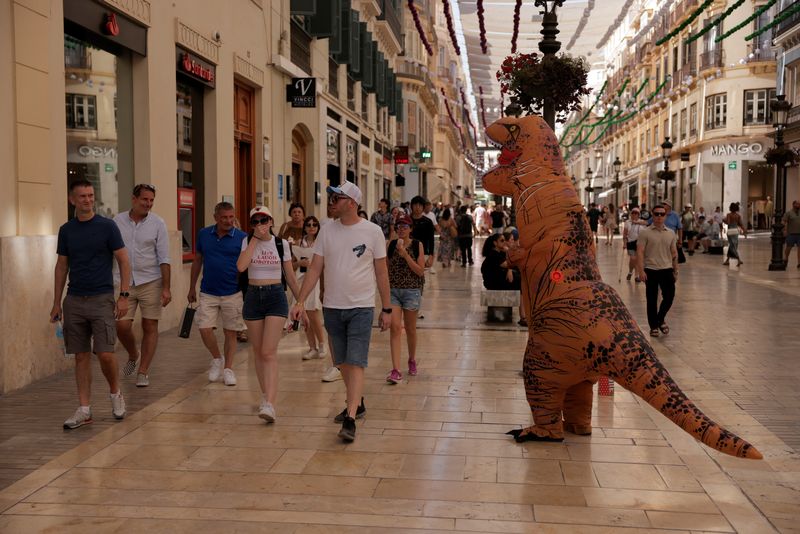By Joanna Plucinska and Jon Nazca
LONDON/MALAGA, Spain (Reuters) - Sun seekers are turning to package holidays in Europe as soaring hotel and flight prices revive demand for the all-inclusive deals that had fallen from favour, bolstering the balance sheets of some travel companies.
The combination of a cost-of-living crisis and disruption from strikes and glitches has added to the appeal of a fixed-price package without unexpected add-on costs and easier redress when things go wrong.
After years of travellers using the internet to compile their own itineraries, travel analysts say a trend of buying a ready-made package that began last year has accelerated this summer, the busiest for travel since the pandemic.
"It's something that you think would have died out back in the seventies," Stuart Hatcher, chief economist at aviation data analysis firm IBA, said. "Since COVID, more people are booking package trips."
Spending on package holidays in Europe - most popular among Britons and Germans - is expected to reach $117 billion this year, up 11% from a year ago and will hit a new peak of $125.9 billion next year, according to Euromonitor.
The resurgence helped TUI, Europe's biggest tour operator, to report on Wednesday quarterly results that beat expectations.
The fixed upfront costs and value for money are appealing, said Caroline Bremner, Euromonitor senior industry manager for travel.
"In times of peak inflation, as over the past two years, (packages) enable consumers to budget more efficiently," she said.
Britons on average spend about $450 per capita on these getaways, Euromonitor's figures show, as the package holiday provider negotiates deals with hotels, transport companies and other players to drive down costs.
But even packages will get more expensive, the market research company forecasts. It predicts prices will grow at a compound annual growth rate (CAGR) of 3.5% between 2024 and 2029, faster than before the pandemic when they rose at a pace of about 1.3% from 2014-2019.
WILL POST-COVID UPSURGE FALTER?
The zest for the holiday package business is a bright spot for the travel industry as worries have grown that the post-pandemic enthusiasm for air travel will ebb as travellers baulk at higher fares.
Particularly in Europe and North America, airfares rose sharply after the pandemic.
Second-quarter results by major carriers pointed to tougher market conditions across the aviation sector.
Last month, Lufthansa warned of a fall in third-quarter earnings as the German airlines group grapples with higher wage costs and limited room to raise ticket prices while Ryanair and Air France-KLM reported plunging quarterly profits.
Shares in Europe's major airlines and travel companies have fallen this year.
In contrast, easyJet (LON:EZJ) raised its full-year outlook for its package holiday business, which launched in 2019 and accounted for more than a quarter of group pretax profit last year.
Package holiday bookings for UK-travel company Jet2 are up 7% this summer, representing about 72% of overall flown passengers, it said in its annual report published last week.
Croatia, Cyprus, Greece, Italy, Malta, Portugal, mainland Spain, the Balearic Islands, the Canaries and Turkey are all popular. The company this week extended flights to Bodrum in Turkey until mid-November due to strong demand.
Norwegian Cruise Line (NYSE:NCLH) Holdings, Carnival (NYSE:CCL) and Royal Caribbean (NYSE:RCL) Group also raised their annual profit forecasts as people flock to its cruises.
'A NICE HOTEL AND A REALLY GOOD DEAL'
For Noreen Cannon, 49, choosing a week's vacation for her family this summer was all about the price, amenities at the hotel and convenience.
"We chose this package because it was a nice hotel and a really good deal," she told Reuters on Thursday after arriving at Malaga, southern Spain, one of Europe's top holiday destinations, from Ireland.
The hotel she picked has a beach, a pool and an area for the children to play in.
Package tours have typically appealed to lower-to-middle income holidaymakers seeking sun and sea with all-inclusive options and family-friendly activities such as beach clubs, Euromonitor's Bremner said.
Greece, Italy and Spain are among the most popular destinations.
Ready-made holidays, which involve little flexibility, account for about half of packages booked over the last year, according to UK travel agent group ABTA.
Typically, they have been favoured by baby boomers, aged over 65 years old, who remember the first wave of enthusiasm for package deals.
Now younger travellers are also keen, tempted by less rigid packages compared with those of the past.
About 56% of 25-34 year-olds went for a shopping-basket style package, choosing between flight and accommodation options, ABTA data shows.
To adapt to younger tastes, TUI CEO Sebastian Ebel said the company has been offering more flexiblity for its packages, such as letting customers book with another airline or adjust the timing of the trip.
Some 800,000 customers selected a flexible package in the quarter to end-June, up 14% from a year earlier, its report said.

"People have a misconception when it comes to packages. They are much more flexible now," Sean Tipton, ABTA spokesperson, said. Their main draws, however, are the same.
"For families, it's about convenience. And it's also about price," he said.